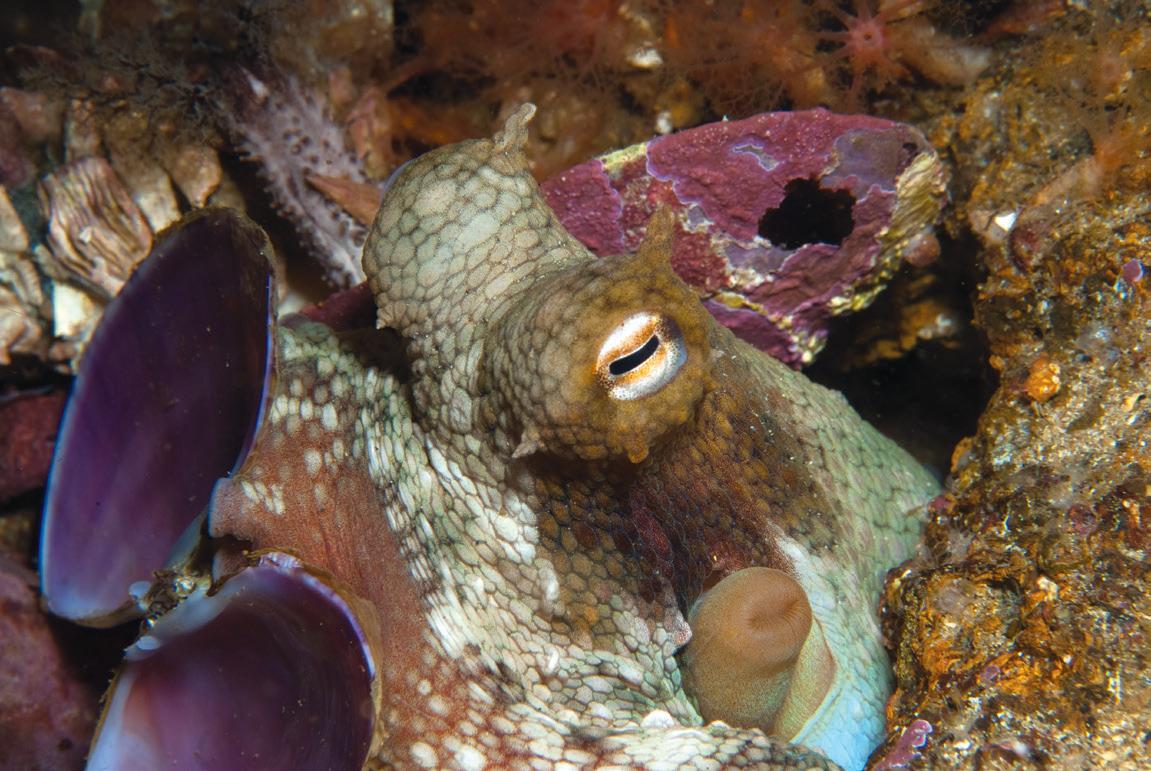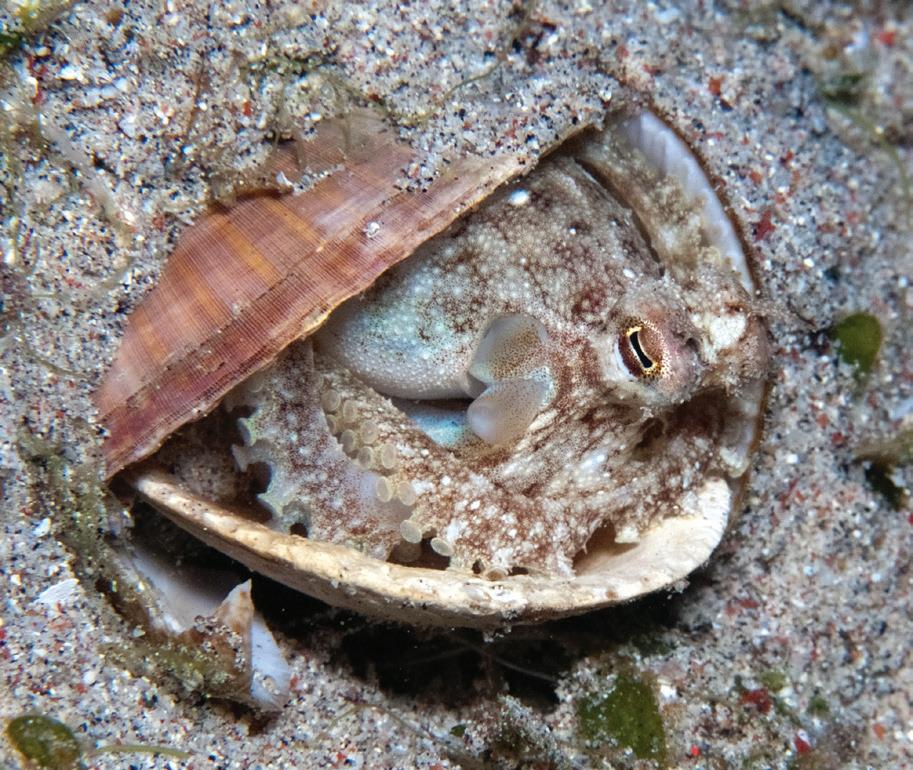
4 minute read
THE BRAINY BUNCH
The intelligence of octopuses is well documented. What is perhaps less well known is where this intelligence comes from. Naturalist Georgina Jones explains some theories around these fascinating creatures, including the role their relatively short lifespans play.
OCTOPUSES ARE SUPERBRIGHT. There’s plenty of evidence of their intelligence too. Take the aquarium where sharks kept turning up dead and partially eaten in the mornings. As it happened, the octopus sharing their tank was using its camouflage skills and the exhibit’s rocks to ambush the sharks, wrestle them belly up to paralyse them, and then eat its fill.
Octopuses in captivity have been shown to be capable of working out how to unscrew lids, even when inside the lidded container. They can distinguish between individual people, and will clamber out of their tanks towards favoured keepers, and squirt water at keepers they dislike. The water squirting trick has also been used to short out annoying overhead lights. They can use coconut shells as armour, and their adaptable skins to mimic other animals with astonishing accuracy. They’ve been filmed getting at bait kept in a container secured with multiple cable ties, all while holding off interested shysharks; and of course there’s the local octopus that successfully hid from a hungry pyjama catshark by hastily assembling a protective shelter of shells.
Given their decidedly non-brainy relatives, snails, slugs, limpets, clams and mussels, octopuses and, indeed, the cephalopods (including squid and cuttlefish) are strangely bright.
Most signs of intelligence are found in longlived social species such as dolphins, elephants, apes, parrots and crows. Humans too. It is thought that needing to manage the complexities of social interactions has been a powerful driver for developing intelligence. Also, that a bigger brain takes time to grow, and helps animals avoid danger and therefore tends to both require and result in a longer lifespan.
But cephalopods aren’t like that. In almost all species, they are solitary, and more, many species are known to be cannibals if given the chance. Even in the few species that are found in groups, the sort of family bonds seen in gorillas or whales do not exist. Also in most cases, they are short lived. Clearly, big brains do not need time to grow. Most octopuses live for less than two years and usually die after reproducing.
Even more intriguingly, there are signs of a loss of intelligence once mating has occurred. Post-mating male octopuses seem to develop a sort of dementia and soon die. Female octopuses stop hunting once they have laid their eggs, and slowly starve while devoting the remainder of their lives to caring for their developing brood. They keep predators away from the eggs, blow aerated water over them and prevent encrusting growths.
This lack of interest in feeding once the eggs have been laid may be a species imperative to stop the mother octopus from feeding on her own young and seems to be driven by hormonal changes.
So parental care seems not to be a driver for intelligence development, at least not in octopuses. Instead, research suggests that cephalopod intelligence may have been driven by the loss of their shells.
Possibly due to competition with fishes, the shelled ancestors of octopuses may have needed to become faster in the water or to retreat to greater depths. Their shells would have been a disadvantage and were gradually lost. Around the same time, ancestral octopuses developed the ability to use jet propulsion to move and also acquired the means to produce camouflaging inks.

A rare glimpse of an octopus in the open.

An octopus in its lair with the remains of a mussel for a shield.
Not having a shell allowed octopuses to extend their bodies into crevices to hunt new and varied prey. Greater intelligence allowed octopuses to take advantage of this extended range of foraging options.
Having flexible bodies probably affected the distribution of their nerve cells as well. Nearly three-quarters of octopus nerve cells are distributed between their eight arms and research shows that the arms can act independently of the brain, improving response time to threats or opportunities. It’s a very different setup to the top-down model known in vertebrates.
It seems likely that the ability of octopuses to change their skins’ colour and texture as well as their body shape developed along with the gradual loss of the shell.
This would have been important, because losing their shells meant the loss of their defensive retreat. Without a shell, an octopus is a prime source of protein to almost every group of marine predators. Octopus intelligence may well have been driven to develop by the necessity of escaping from incessant predation.
Without social bonds or the need to pass on skills, the life of an octopus revolves around hunting, escaping, finding a mate and then reproducing. Their brains develop fast, and once they have produced their descendants, their brains, so far as can be observed, are not required any further. Octopuses live fast and die young. Their intelligence is profoundly alien to ours, and would be fascinating to properly understand, emerging, as it does, from very different roots.

This tiny octopus has made an abandoned shell its home.










